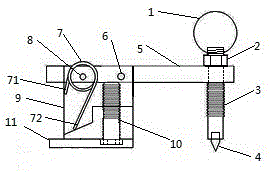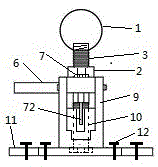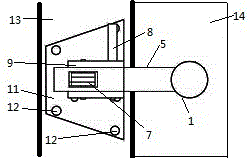Fixed vehicle emergency escape device
An escape device, a fixed technology, applied in vehicle parts, transportation and packaging, vehicle safety arrangements, etc., can solve the problems of large space, short effective arm, incompatibility, etc. , the effect of short force distance
- Summary
- Abstract
- Description
- Claims
- Application Information
AI Technical Summary
Problems solved by technology
Method used
Image
Examples
Embodiment Construction
[0024] Such as figure 1 , 2 , the emergency evacuation device in the fixed vehicle shown in 3 is composed of a spherical handle 1, a nut 2, a screw rod 3, a rivet 4, a rotating arm 5, a safety pin 6, a torsion spring 7, a pin 8, a support 9, and an inner hexagon screw 10. Composed of trapezoidal base 11 and screws 12, it is characterized in that the spherical handle 1 is screwed to the upper end of the screw rod 3 through threads, the screw rod 3 is screwed to the front end of the rotating arm 5 through threads, and the nut 2 is set on the screw rod 3 and is located on the rotating arm 5 In the middle of the spherical handle 1, the rivet 4 is embedded in the lower end of the screw rod 3, and the tip of the rivet 4 touches the window glass surface, and the rear end of the rotating arm 5 is fixed with the support 9 by the pin 8, and the pin 8 passes through the support 9, twists Spring 7, rotating arm 5, safety pin 6 pass bearing 9, rotating arm 5, the upper leg 71 of torsion s...
PUM
 Login to View More
Login to View More Abstract
Description
Claims
Application Information
 Login to View More
Login to View More - R&D
- Intellectual Property
- Life Sciences
- Materials
- Tech Scout
- Unparalleled Data Quality
- Higher Quality Content
- 60% Fewer Hallucinations
Browse by: Latest US Patents, China's latest patents, Technical Efficacy Thesaurus, Application Domain, Technology Topic, Popular Technical Reports.
© 2025 PatSnap. All rights reserved.Legal|Privacy policy|Modern Slavery Act Transparency Statement|Sitemap|About US| Contact US: help@patsnap.com



